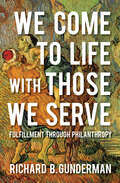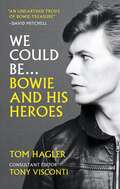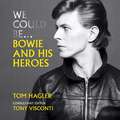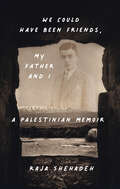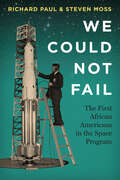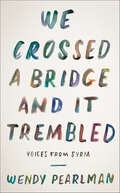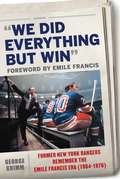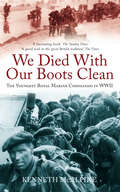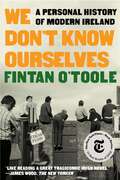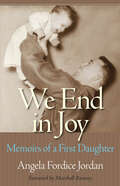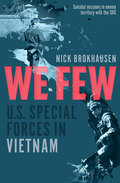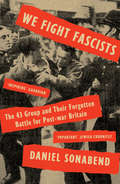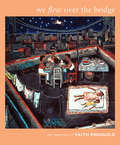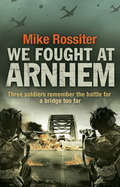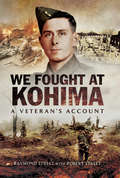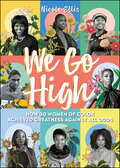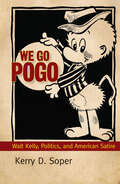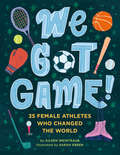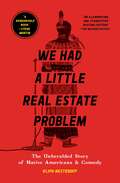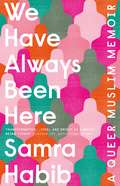- Table View
- List View
We Come to Life with Those We Serve: Fulfillment through Philanthropy
by Richard B. GundermanA study of how philanthropy can enrich our lives, as shown by examples from both the lives of real-life individuals and fictional characters.What is the most meaningful and rewarding path in life? Many assume we enrich ourselves only by accumulating more wealth, power, and fame, or by finding new and greater forms of pleasure. In reality, we are most enriched not in taking from others but in sharing the best we have to offer through a life of service. The legendary, real-life individuals and the famous literary characters in this inspiring book show us the way: Vincent Van Gogh exemplified service through art, Benjamin Franklin dedicated his life to service of community, and the career of coach John Wooden is apt testimony to the rewards of service through education. Gunderman persuasively argues that, far from draining away our vitality, service at its best actually brings us to life.
We Could Be: Bowie and his Heroes
by Tom Hagler***With consultant editor Tony Visconti. David Bowie's story has never been told quite like this.Tracing the star's encounters with fellow icons throughout his life, We Could Be offers a new history of Bowie, collecting 300 short stories that together paint a portrait of humour, humility, compassion, tragedy and more besides.He embarrasses himself in front of Lennon and Warhol. He saves the life of Nina Simone. He is hated by Bob Dylan. He teaches Michael Jackson the moonwalk. Individually astonishing, together these stories - including details never before revealed - build a new picture of Bowie, one which shows his vulnerability, his sense of humour, his inner diva.Exhaustively researched from thousands of sources by BBC reporter and Bowie obsessive Tom Hagler - with the guidance and memories of Bowie's long-time producer Tony Visconti - We Could Be is fascinating, comic, compelling, and a history of Bowie unlike any that has come before.
We Could Be: Bowie and his Heroes
by Tom Hagler***With consultant editor Tony Visconti. David Bowie's story has never been told quite like this.Tracing the star's encounters with fellow icons throughout his life, We Could Be offers a new history of Bowie, collecting 300 short stories that together paint a portrait of humour, humility, compassion, tragedy and more besides.He embarrasses himself in front of Lennon and Warhol. He saves the life of Nina Simone. He is hated by Bob Dylan. He teaches Michael Jackson the moonwalk. Individually astonishing, together these stories - including details never before revealed - build a new picture of Bowie, one which shows his vulnerability, his sense of humour, his inner diva.Exhaustively researched from thousands of sources by BBC reporter and Bowie obsessive Tom Hagler - with the guidance and memories of Bowie's long-time producer Tony Visconti - We Could Be is fascinating, comic, compelling, and a history of Bowie unlike any that has come before.
We Could Be: Bowie and his Heroes
by Tom Hagler***With consultant editor Tony Visconti. David Bowie's story has never been told quite like this.Tracing the star's encounters with fellow icons throughout his life, We Could Be offers a new history of Bowie, collecting 300 short stories that together paint a portrait of humour, humility, compassion, tragedy and more besides.He embarrasses himself in front of Lennon and Warhol. He saves the life of Nina Simone. He is hated by Bob Dylan. He teaches Michael Jackson the moonwalk. Individually astonishing, together these stories - including details never before revealed - build a new picture of Bowie, one which shows his vulnerability, his sense of humour, his inner diva.Exhaustively researched from thousands of sources by BBC reporter and Bowie obsessive Tom Hagler - with the guidance and memories of Bowie's long-time producer Tony Visconti - We Could Be is fascinating, comic, compelling, and a history of Bowie unlike any that has come before.(P)Octopus Publishing Group 2021
We Could Have Been Friends, My Father and I: A Palestinian Memoir
by Raja ShehadehA subtle psychological portrait of the author&’s relationship with his father during the twentieth-century battle for Palestinian human rights.Aziz Shehadeh was many things: lawyer, activist, and political detainee, he was also the father of bestselling author and activist Raja. In this new and searingly personal memoir, Raja Shehadeh unpicks the snags and complexities of their relationship. A vocal and fearless opponent, Aziz resists under the British mandatory period, then under Jordan, and, finally, under Israel. As a young man, Raja fails to recognize his father&’s courage and, in turn, his father does not appreciate Raja&’s own efforts in campaigning for Palestinian human rights. When Aziz is murdered in 1985, it changes Raja irrevocably. This is not only the story of the battle against the various oppressors of the Palestinians, but a moving portrait of a particular father and son relationship.
We Could Not Fail: The First African Americans in the Space Program
by Richard Paul Steven MossThis &“surprising and insightful&” history profiles ten African American engineers, mathematicians, and others who worked for NASA&’s space program (Lauren Helmuth, New York Times Book Review).The Space Age began just as the struggle for civil rights forced Americans to confront the bitter legacy of slavery, discrimination, and violence against African Americans. NASA itself became an agent of social change, with President Kennedy opening its workplaces to African Americans. In We Could Not Fail, Richard Paul and Steven Moss profile ten pioneer African American space workers whose stories illustrate the role NASA and the space program played in promoting civil rights.Paul and Moss recount how these technicians, mathematicians, engineers, and an astronaut candidate surmounted barriers and navigated being the sole African American in a NASA work group. These brave and determined men went on to help transform Southern society by integrating colleges, patenting new inventions, holding elective office, and reviving and governing defunct towns. Adding new names to the roster of civil rights heroes and a new chapter to the story of space exploration, We Could Not Fail demonstrates how African Americans broke the color barrier by competing successfully at the highest level of American intellectual and technological achievement.
We Could Not Fail: The First African Americans in the Space Program
by Richard Paul Steven MossThis &“surprising and insightful&” history profiles ten African American engineers, mathematicians, and others who worked for NASA&’s space program (Lauren Helmuth, New York Times Book Review).The Space Age began just as the struggle for civil rights forced Americans to confront the bitter legacy of slavery, discrimination, and violence against African Americans. NASA itself became an agent of social change, with President Kennedy opening its workplaces to African Americans. In We Could Not Fail, Richard Paul and Steven Moss profile ten pioneer African American space workers whose stories illustrate the role NASA and the space program played in promoting civil rights.Paul and Moss recount how these technicians, mathematicians, engineers, and an astronaut candidate surmounted barriers and navigated being the sole African American in a NASA work group. These brave and determined men went on to help transform Southern society by integrating colleges, patenting new inventions, holding elective office, and reviving and governing defunct towns. Adding new names to the roster of civil rights heroes and a new chapter to the story of space exploration, We Could Not Fail demonstrates how African Americans broke the color barrier by competing successfully at the highest level of American intellectual and technological achievement.
We Crossed a Bridge and It Trembled: Voices from Syria
by Wendy PearlmanLONG-LISTED FOR THE CARNEGIE MEDALReminiscent of the work of Nobel Prize winner Svetlana Alexievich, an astonishing collection of intimate wartime testimonies and poetic fragments from a cross-section of Syrians whose lives have been transformed by revolution, war, and flight.Against the backdrop of the wave of demonstrations known as the Arab Spring, in 2011 hundreds of thousands of Syrians took to the streets demanding freedom, democracy and human rights. The government’s ferocious response, and the refusal of the demonstrators to back down, sparked a brutal civil war that over the past five years has escalated into the worst humanitarian catastrophe of our times. Yet despite all the reporting, the video, and the wrenching photography, the stories of ordinary Syrians remain unheard, while the stories told about them have been distorted by broad brush dread and political expediency. This fierce and poignant collection changes that. Based on interviews with hundreds of displaced Syrians conducted over four years across the Middle East and Europe, We Crossed a Bridge and It Trembled is a breathtaking mosaic of first-hand testimonials from the frontlines. Some of the testimonies are several pages long, eloquent narratives that could stand alone as short stories; others are only a few sentences, poetic and aphoristic. Together, they cohere into an unforgettable chronicle that is not only a testament to the power of storytelling but to the strength of those who face darkness with hope, courage, and moral conviction.
We Danced All Night: My Life Behind the Scenes with Alan Jay Lerner
by Doris ShapiroMrs. Shapiro's 14 years as an assistant to Alan Jay Lerner, from before "My Fair Lady" to "On a Clear Day You Can See Forever."
We Did Everything But Win: Former New York Rangers Remember the Emile Francis Era (1964-1976)
by George Grimm Emile FrancisWe Did Everything But Win: An Oral History of the Emile Francis Era New York Rangers (1964–1976) is an entertaining account of one of the most exciting and unforgettable periods in the history of the Broadway Blueshirts as told by Francis as well as several of his players.George Grimm chronicles each season of the Francis era when “The Cat” transformed them from perennial league doormats to a team that made it to the Stanley Cup playoffs for nine consecutive seasons, including a Finals appearance in 1972. There are also chapters detailing Emile’s playing career and his hiring as general manager as well as the aftermath of his dismissal and an analysis of his tenure behind the bench and as GM. It was during those years that the National Hockey League doubled in size and the Rangers moved into a brand-new Madison Square Garden. As the popularity of the National Hockey League skyrocketed, who could forget the Rangers’ battles on the ice with Boston’s Big Bad Bruins and Philadelphia’s Broad Street Bullies and showdowns with the Montreal Canadiens and Chicago Black Hawks? All the great moments are here including a heart-stopping, triple-overtime victory in the 1971 playoffs and Vic Hadfield’s 50th goal the following season. We Did Everything But Win is a tribute to the Rangers of that era; Jacques Plante and Marcel Paille, Eddie Giacomin and Gilles Villemure, Harry Howell and Jim “The Chief” Neilson, “The Old Smoothies,” the “G-A-G Line,” and the “Bulldog Line.” It’s the story of colorful players with nicknames like “Boomer,” “Stemmer,” and “Sarge” and fan favorites such as Brad Park, Rod Gilbert, Jean Ratelle, Walt Tkaczuk. It’s all here—the highs and the lows, the inspiring victories, the devastating losses, and the funny moments along the way.
We Die Alone
by David HowarthLeft Jacket: "David Howarth's book opens as the small fishing boat containing Jan Baalsrud and the three other members of his sabotage group closes with the Norwegian coast. From that moment everything goes wrong. The plan is betrayed by a Quisling. A German warship appears in the fjord where they are hidden, and all but Jan are killed or taken prisoner. Alone, wounded, wet to the skin and woefully ill-equipped to withstand the rigours of the Arctic blizzards, Baalsrud fights to retain his freedom. As the pace quickens and the fugitive grows weary and progressively unable to cope with his surroundings, the writing takes on an urgency that makes the reader turn the pages with tense excitement. From now on Jan is hidden by a succession of heroic men and women who risk their lives and the lives of their families to help him get away. This is indeed a story of quiet heroism, of the triumph of human courage, fortitude and charity over the forces of oppression."
We Died With Our Boots Clean: The Youngest Royal Marine Commando in WWII
by Kenneth McAlpineAt the age of seventeen, Kenneth McAlpine ran away from the Repton school to join Churchill's new elite special force, the Royal Marine Commandos. As the youngest member of the youngest commando force, after three months he found himself fighting on the beaches of Normandy. In We Died With Our Boots Clean, McAlpine tells his own unique story of World War II and his highly eventful military career. From an unusual encounter with Montgomery and Patton, a concerted attempt to kill a sergeant major and his best friend’s arrest for swearing at the Queen of Holland, McAlpine paints a fascinating picture of commando life and the harsh training that prepared soldiers for frontline combat in an elite unit. Full of absorbing anecdotes such as his time in a military prison and a rescue operation at a concentration camp, this book is an essential part of a World War II enthusiast’s library.
We Don't Know Ourselves: A Personal History of Modern Ireland
by Fintan O'TooleNEW YORK TIMES BESTSELLER NEW YORK TIMES • 10 BEST BOOKS OF THE YEAR NATIONAL BESTSELLER The Atlantic: 10 Best Books of 2022 Best Books of the Year: Washington Post, New Yorker, Salon, Foreign Affairs, New Statesman, Chicago Public Library, Vroman's “[L]ike reading a great tragicomic Irish novel.” —James Wood, The New Yorker “Masterful . . . astonishing.” —Cullen Murphy, The Atlantic "A landmark history . . . Leavened by the brilliance of O'Toole's insights and wit.” —Claire Messud, Harper’s Winner • 2021 An Post Irish Book Award — Nonfiction Book of the Year • from the judges: “The most remarkable Irish nonfiction book I’ve read in the last 10 years”; “[A] book for the ages.” A celebrated Irish writer’s magisterial, brilliantly insightful chronicle of the wrenching transformations that dragged his homeland into the modern world. Fintan O’Toole was born in the year the revolution began. It was 1958, and the Irish government—in despair, because all the young people were leaving—opened the country to foreign investment and popular culture. So began a decades-long, ongoing experiment with Irish national identity. In We Don’t Know Ourselves, O’Toole, one of the Anglophone world’s most consummate stylists, weaves his own experiences into Irish social, cultural, and economic change, showing how Ireland, in just one lifetime, has gone from a reactionary “backwater” to an almost totally open society—perhaps the most astonishing national transformation in modern history. Born to a working-class family in the Dublin suburbs, O’Toole served as an altar boy and attended a Christian Brothers school, much as his forebears did. He was enthralled by American Westerns suddenly appearing on Irish television, which were not that far from his own experience, given that Ireland’s main export was beef and it was still not unknown for herds of cattle to clatter down Dublin’s streets. Yet the Westerns were a sign of what was to come. O’Toole narrates the once unthinkable collapse of the all-powerful Catholic Church, brought down by scandal and by the activism of ordinary Irish, women in particular. He relates the horrific violence of the Troubles in Northern Ireland, which led most Irish to reject violent nationalism. In O’Toole’s telling, America became a lodestar, from John F. Kennedy’s 1963 visit, when the soon-to-be martyred American president was welcomed as a native son, to the emergence of the Irish technology sector in the late 1990s, driven by American corporations, which set Ireland on the path toward particular disaster during the 2008 financial crisis. A remarkably compassionate yet exacting observer, O’Toole in coruscating prose captures the peculiar Irish habit of “deliberate unknowing,” which allowed myths of national greatness to persist even as the foundations were crumbling. Forty years in the making, We Don’t Know Ourselves is a landmark work, a memoir and a national history that ultimately reveals how the two modes are entwined for all of us.
We End in Joy: Memoirs of a First Daughter
by Angela Fordice JordanWe End in Joy: Memoirs of a First Daughter offers an extraordinary perspective on public life in an intimate account from the daughter of a highly controversial southern governor and a widely beloved first lady.Angela Jordan enjoyed a comfortable and quiet life in Vicksburg, the small southern town in which she was reared. She was a thirty-five-year-old mother of three daughters, and a woman with a politically liberal bent, when, against all history's odds, Mississippians elected her conservative Republican father, Kirk Fordice, governor in 1991.Suddenly fate threw the whole Fordice family into the glaring lights of public life. They made headlines, enlivened the 6 o'clock television news, and provided fodder for every dinner table conversation and robust political speculation around the Southeast. As the Governor and First Lady Fordices' longstanding marriage dissolved slowly and publicly over two terms in office, everyone with a newspaper subscription or a cable connection watched the train wreck and high-profile betrayals.In honest, direct, sometimes poignant, and often funny prose, the author offers a rare glimpse into a profoundly complex family and its painfully public fall from grace. Though the book is the story behind the headlines of one of Mississippi's prominent families, Jordan's narrative will also resonate with anyone who has experienced humiliation, divorce, or loss, whether public or private. Through it all, Jordan finds a story of joy ascendant, and the wonder of discovering that in the deepest sorrow, light and love always shine through.
We Few: U.S. Special Forces in Vietnam
by Nick BrokhausenA Green Beret&’s gripping memoir of American Special Forces in Southeast Asia during the Vietnam War. In 1970, on his second tour to Vietnam, Nick Brokhausen served in Recon Team Habu, CCN. Officially, it was known as the Studies and Observations group. In fact, this Special Forces squad, which Brokhausen calls &“an unwashed, profane, ribald, joyously alive fraternity,&” undertook some of the most dangerous and suicidal reconnaissance missions ever in the enemy-controlled territory of Cambodia and Laos. But they didn&’t infiltrate the jungles alone. They fought alongside the Montagnards—oppressed minorities from the mountain highlands, trained by the US military in guerilla tactics, armed, accustomed to the wild, and fully engaged in a war against the North Vietnamese. Together this small unit formed the backbone of ground reconnaissance in the Republic of Vietnam, racking up medals for valor—but at a terrible cost. &“In colorful, military-jargon-laced prose leavened by gallows humor, Brokhausen pulls few punches describing what it was like to navigate remote jungle terrain under the constant threat of enemy fire. A smartly written, insider&’s view of one rarely seen Vietnam War battleground.&” —Booklist &“[An] exceptionally raw look at the Vietnam War just at the apex of its unpopularity. . . . This battle-scarred memoir is an excellent tribute to the generation that fought, laughed, and died in Southeast Asia.&” —New York Journal of Books
We Fight Fascists: The 43 Group and Their Forgotten Battle for Post-war Britain
by Daniel SonabendThe extraordinary story of the Jewish ex-servicemen fighting fascism in post-war BritainReturning to civilian life, at the close of the Second World War, a group of Jewish veterans discovered that, for all their effort and sacrifice, their fight was not yet done. Creeping back onto the streets were Britain&’s homegrown fascists, directed from the shadows by Sir Oswald Mosley. Horrified that the authorities refused to act, forty-three Jewish exservicemen and women resolved to take matters into their own hands. In 1946, they founded the 43 Group and let it be known that they were willing to stop the far-right resurgence by any means necessary. Their numbers quickly swelled. Joining the battlehardened ex-servicemen in smashing up fascist meetings were younger Jews, including hairdresser Vidal Sassoon, and gentiles as well, some of whom volunteered to infiltrate fascist organisations. The Group published its own newspaper, conducted covert operations, and was able to muster a powerful force of hundreds of fighters who quickly turned fascist street meetings into mass brawls. The struggle peaked in the summer of 1947 with the Battle of Ridley Road, where thousands descended on the Hackney market to participate in weekly riots. The history of the 43 Group is not just a gripping story of a forgotten moment in Britain&’s post-war history; it is also a timely lesson in how to confront fascism—and how to win.
We Flew over the Bridge: The Memoirs of Faith Ringgold
by Faith RinggoldIn We Flew over the Bridge, one of the country’s preeminent African American artists—and award-winning children’s book authors—shares the fascinating story of her life. Faith Ringgold’s artworks—startling “story quilts,” politically charged paintings, and more—hang in the Studio Museum in Harlem, the Metropolitan Museum of Art, the Guggenheim Museum, the Museum of Modern Art, and other major museums around the world, as well as in the private collections of Maya Angelou, Bill Cosby, and Oprah Winfrey. Her children’s books, including the Caldecott Honor Book Tar Beach, have sold hundreds of thousands of copies. But Ringgold’s path to success has not been easy. In this gorgeously illustrated memoir, she looks back and shares the story of her struggles, growth, and triumphs. Ringgold recollects how she had to surmount a wall of prejudices as she worked to refine her artistic vision and raise a family. At the same time, the story she tells is one of warm family memories and sustaining friendships, community involvement, and hope for the future.
We Fought at Arnhem
by Mike RossiterOperation Market Garden: a plan to capture the bridge over the Rhine at Arnhem and outflank the German front. In all twelve thousand airborne troops were to land, either by parachute or glider, at three drop zones and move towards their objective. As the world now knows the mission was to be 'a bridge too far' for the British forces. Mike Rossiter has interviewed three of the survivors of those fateful days, each involved in a different flank of the British attack, and in vivid detail reconstructs the events that lead up to this most famous of glorious defeats. It is at once a story of hubris and bad planning, but also of valiant sacrifice and inspirational courage.
We Fought at Kohima: At Veteran's Account
by Robert Street Raymond StreetThe Japanese advance through Thailand, Malaya and Burma appeared unstoppable and the fate of India looked utterly precarious.The garrison of the Kohima outpost numbering some 1500 British and Indian Army soldiers faced over 13,000 fanatical and previously victorious Japanese troops. The following sixteen days marked the turning point of the war in the Far East thanks to men like Raymond Street who fought with legendary courage and tireless persistence.Raymond was a member of the 4th Battalion The Queen's West Kent and as a company runner he was uniquely placed to witness the dreadful and dramatic events as they unfolded. Not only did he miraculously survive but he made a superb record of the battle as fortunes ebbed and flowed. His memories have been transcribed into this first-hand account of one of the most decisive and hardest fought battles of the Second World War. We Fought at Kohima will surely be judged as a fighting man's memoir of the highest quality to rank alongside such legendary works as Men at Arnhem and Quartered Safe Out Here.
We Gave Away a Fortune
by Christopher Mogil Anne Slepian Peter WoodrowStories of People Who Have Devoted Themselves and Their Wealth To Peace, Justice and a Healthy Environment
We Go High: How 30 Women of Colour Achieved Greatness against all Odds
by Nicole EllisFollow the life lessons of 30 remarkable women of color who are making their mark on society and culture. "When you are struggling and you start thinking about giving up, I want you to remember something ... and that is the power of hope." -Michelle Obama (White House speech, 2017) We Go High brings together the inspiring stories, motivational quotes, and personal philosophies of 30 influential women of color who have sought to overcome challenges in their lives. From activists to scientists, artists to sporting icons, each woman's story is different-but all have in common a deep-seated resilience to fight against the prejudices and barriers to success that women of color face on a daily basis. The book features political powerhouses such as Kamala Harris and Stacey Abrams, as well as businesswomen like Arundhati Bhattacharya and Angelica Ross, and writers Michaela Coel and Amanda Gorman. With 30 stunning, specially commissioned portraits, We Go High not only celebrates these remarkable women's achievements, but uncovers the personal beliefs, attitudes, and determination that drive them.
We Go Pogo: Walt Kelly, Politics, and American Satire (Tom Inge Series on Comics Artists)
by Kerry D. SoperWalt Kelly (1913–1973) is one of the most respected and innovative American cartoonists of the twentieth century. His long-running Pogo newspaper strip has been cited by modern comics artists and scholars as one of the best ever. Cartoonists Bill Watterson (Calvin and Hobbes), Jeff Smith (Bone), and Frank Cho (Liberty Meadows) have all cited Kelly as a major influence on their work. Alongside Uncle Scrooge's Carl Barks and Krazy Kat's George Herriman, Kelly is recognized as a genius of “funny animal” comics. We Go Pogo is the first comprehensive study of Kelly's cartoon art and his larger career in the comics business. Author Kerry D. Soper examines all aspects of Kelly's career—from his high school drawings; his work on such animated Disney movies as Dumbo, Pinocchio, and Fantasia; and his 1930s editorial cartoons for Life and the New York Herald Tribune. Soper taps Kelly's extensive personal and professional correspondence and interviews with family members, friends, and cartoonists to create a complex portrait of one of the art form's true geniuses. From Pogo's inception in 1948 until Kelly's death, the artist combined remarkable draftsmanship, slapstick humor, fierce social satire, and inventive dialogue and dialects. He used the adventures of his animals—all denizens of the Okefenokee Swamp—as a means to comment on American and international politics and cultural mores. The strip lampooned Senator Joseph McCarthy during the height of McCarthyism, the John Birch Society during the 1960s, Fidel Castro during the Bay of Pigs fiasco, and many others.
We Got Game!: 35 Female Athletes Who Changed the World
by Aileen WeintraubInspire kids to be their best selves and get involved in social change with this stunning anthology about thirty-five amazing women in sports around the world and throughout history. <P><P>Do you play sports? Maybe you dream about scoring a goal on the soccer field or hitting a home run in baseball. Perhaps you're thinking about trying a new sport, but you're still not sure. <P><P>In We Got Game! you'll meet thirty-five female athletes who played hard, broke records, and inspired girls around the world. Some of these athletes have retired. Others are still competing. But they have one thing in common: they all got game! You'll read about the first woman horse jockey to compete in the Kentucky Derby, the number one tennis player in the world, a surfer who lost her arm in a shark attack, and a snow boarder who landed a death-defying jump, along with many others. These female athletes prove that girls can do anything! <P><P>Simone Biles * Gretchen Bleiler * Hannah Cockroft * Misty Copeland * Diane Crump * Sasha DiGiulian * Gabby Douglas * Grete Eliassen * Marlen Esparza * Lisa Fernandez * Althea Gibson * Bethany Hamilton * Mia Hamm * Jackie Joyner-Kersee * Billie Jean King * Phaidra Knight * Silken Laumann * Nancy Lopez * Tatyana McFadden * Ibtihaj Mohammad * Danica Patrick * Megan Rapinoe * Mary Lou Retton * Manon Rhéaume * Ronda Rousey * Wilma Rudolph * Junko Tabei * Dara Torres * Elana Myers Taylor * Marianne Vos * Abby Wambach * Maria Toorpakai Wazir * Jen Welter * Serena Williams * Kristi Yamaguchi
We Had a Little Real Estate Problem: The Unheralded Story of Native Americans & Comedy
by Kliph NesteroffA Best Book of 2021 by NPR and Esquire From Kliph Nesteroff, &“the human encyclopedia of comedy&” (VICE), comes the important and underappreciated story of Native Americans and comedy.It was one of the most reliable jokes in Charlie Hill&’s stand-up routine: &“My people are from Wisconsin. We used to be from New York. We had a little real estate problem.&” In We Had a Little Real Estate Problem, acclaimed comedy historian Kliph Nesteroff focuses on one of comedy&’s most significant and little-known stories: how, despite having been denied representation in the entertainment industry, Native Americans have influenced and advanced the art form. The account begins in the late 1880s, when Native Americans were forced to tour in wild west shows as an alternative to prison. (One modern comedian said it was as &“if a Guantanamo detainee suddenly had to appear on X-Factor.&”) This is followed by a detailed look at the life and work of seminal figures such as Cherokee humorist Will Rogers and Hill, who in the 1970s was the first Native American comedian to appear The Tonight Show. Also profiled are several contemporary comedians, including Jonny Roberts, a social worker from the Red Lake Nation who drives five hours to the closest comedy club to pursue his stand-up dreams; Kiowa-Apache comic Adrianne Chalepah, who formed the touring group the Native Ladies of Comedy; and the 1491s, a sketch troupe whose satire is smashing stereotypes to critical acclaim. As Ryan Red Corn, the Osage member of the 1491s, says: &“The American narrative dictates that Indians are supposed to be sad. It&’s not really true and it&’s not indicative of the community experience itself…Laughter and joy is very much a part of Native culture.&” Featuring dozens of original interviews and the exhaustive research that is Nesteroff&’s trademark, We Had a Little Real Estate Problem is a powerful tribute to a neglected legacy.
We Have Always Been Here
by Samra HabibTriumphant and uplifting - a queer Muslim memoir about forgiveness and freedom.'Revolutionary' Mona Eltahawy * 'Exquisite, powerful and urgent' Stacey May Fowles * 'I fell in love with this book' Shani MootooA memoir of hope, faith and love, Samra Habib's story starts with growing up as part of a threatened minority sect in Pakistan, and follows her arrival in Canada as a refugee, before escaping an arranged marriage at sixteen. When she realized she was queer, it was yet another way she felt like an outsider. So begins a journey that takes her to the far reaches of the globe to uncover a truth that was within her all along. It shows how Muslims can embrace queer sexuality, and families can embrace change. A triumphant story of forgiveness and freedom, We Have Always Been Here is a rallying cry for anyone who has ever felt alone and a testament to the power of fearlessly inhabiting one's truest self.
